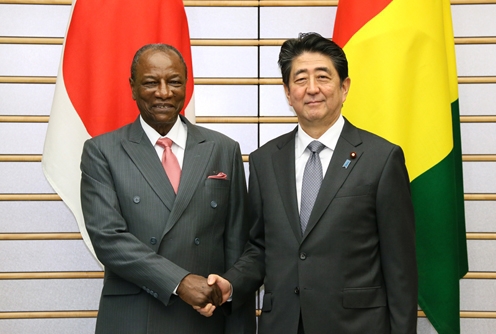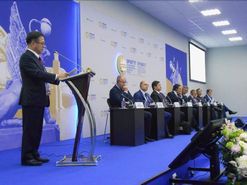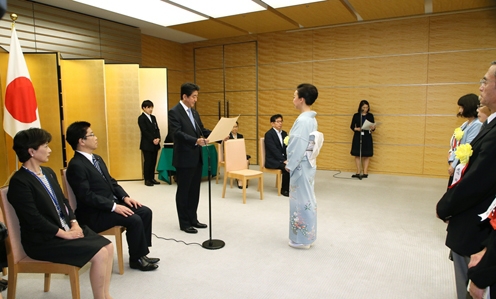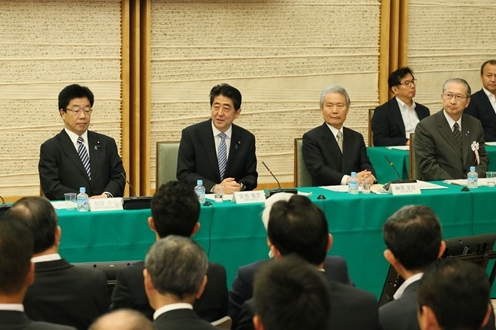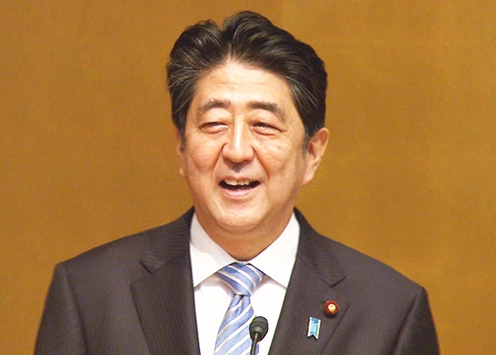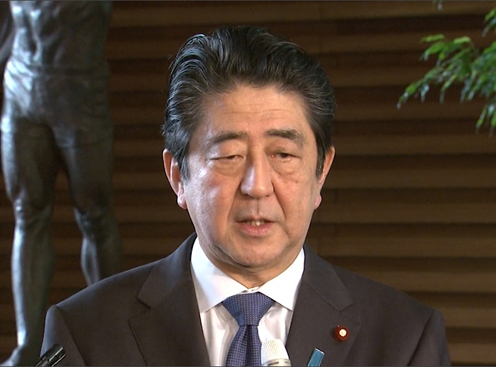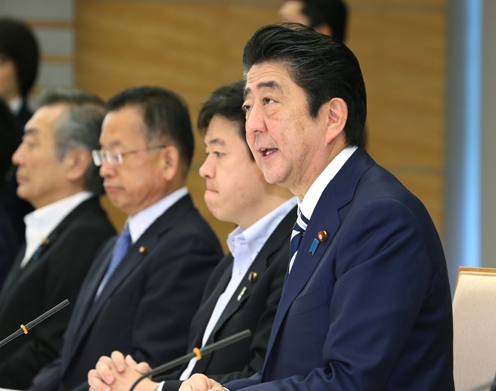Japan-Guinea Summit Meeting and Other Events
Cabinet Secretariat, Wednesday, June 21, 2017
Prime Minister Shinzo Abe held a summit meeting and other events with H.E. Professor Alpha Condé, President of the Republic of Guinea, at the Prime Minister's Office.
The two leaders attended a salute and guard of honor ceremony, followed by a summit meeting. Thereafter, the leaders held a signing ceremony and a joint press announcement.
Message of Congratulations from Prime Minister Shinzo Abe to Crown Prince Mohammed bin Salman bin Abdulaziz Al Saud upon his appointment as Crown Prince
Foreign Affairs, Thursday, June 22, 2017
Upon the appointment of H.R.H. Prince Mohammed bin Salman bin Abdulaziz Al Saud as Crown Prince and Deputy Prime Minister of the Kingdom of Saudi Arabia on June 21, Prime Minister Shinzo Abe sent a congratulatory message to H.R.H. Crown Prince on June 22.
Mr. Seko, Minister of Economy, Trade and Industry and Minister for Economic Cooperation with Russia, Visits the Russian Federation
METI, Friday, June 16, 2017
From June 2 (Fri.) to 4 (Sun.), 2017, Mr. Hiroshige Seko, Minister of Economy, Trade and Industry and Minister for Economic Cooperation with Russia, visited Saint Petersburg, the Russian Federation. He attended the St. Petersburg International Economic Forum, as the first Japanese minister to do so, as well as a Japan-Russia Business Roundtable meeting and a meeting with H.E. Mr. Maksim Oreshkin, Minister of Economic Development, Russian Federation, and Special Representative for Trade and Economic Cooperation with Japan.
1. Attending a Japan-Russia Business Roundtable meeting (June 2)
Minister Seko attended a Japan-Russia Business Roundtable meeting, organized by the Japan Association for Trade with Russia and NIS and the Russian-Japanese Business Council, titled “Japan-Russia: Current Status of Japan-Russia Economic Cooperation and Future Perspectives.” At the beginning of the meeting, Minister Seko reported on progress achieved in efforts toward the eight-point cooperation plan and Japan’s policy for future efforts. The meeting was a meaningful opportunity for the development of Japan-Russia economic relations, as seen in other participants’ presentations of constructive opinions, including sharing of successful case examples of Japan-Russia business cooperation, and presentation of specific proposals for expanding investment opportunities.
2. Meeting with Minister Oreshkin (June 2)
Both ministers confirmed the smooth advancement of efforts involving the eight-point cooperation plan and also exchanged views concerning certain issues, including an approach to advancing respective issues for a Japan-Russia summit meeting scheduled to be held in Vladivostok, Russia, in September 2017.
Award Ceremony in Relation to the Formation of a Gender-Equal Society
Cabinet Secretariat, Thursday, June 22, 2017
[Provisional Translation]
Prime Minister Shinzo Abe attended the Award Ceremony in Relation to the Formation of a Gender-Equal Society, held at the Prime Minister’s Office.
After presenting the awards, the Prime Minister said,
“I would like to state my sincere congratulations to the recipients of the Prime Minister's Commendation for Efforts Toward the Formation of a Gender-Equal Society, the Women’s Challenge Grand Prize, and the Gender Equality Week Slogan Contest.
The recipients of the Prime Minister's Commendation for Efforts Toward the Formation of a Gender-Equal Society have exerted efforts toward the promotion of gender equality in a large number of fields over many years. In the regions, you have expanded the areas in which woman can actively take part in fields including the machine parts and tooling industries, the JA Group, sports, and research activities. You have provided consultations for victims of spousal violence, given them shelter, and supported their recovery. You have also participated in national and regional government policy-making. I would like to express my deep respect for your activities.
I look forward to the continued activities of the recipients of the Women’s Challenge Grand Prize, as role models and supporters for a large number of women.
In slightly more than four years, the number of women employed has increased by 1.5 million. The current situation is that Japan’s economy is simply not viable without the participation of women.
I would like to conclude my remarks by sincerely requesting that all the recipients of today’s awards exert even greater efforts in their respective fields and regions, toward creating a society in which women can participate to their hearts’ content.
Once again, my heartfelt congratulations.”
Japan Presents to the General Assembly of the Bureau International des Expositions (BIE) on June 14, 2017, as a Part of Bid to Host the World Expo 2025 in Osaka
METI, Monday, June 19, 2017
The government of Japan and the 2025 Japan World Expo Committee jointly made a presentation before BIE member countries attending the BIE General Assembly held in Paris, France, on June 14, 2017, as a part of bid to host the World Expo 2025 in Osaka.
1. Background and purpose
On April 24, 2017, Japan submitted a document to the BIE declaring Japan’s candidature to host the World Expo 2025 under the theme “Designing Future Society for Our Lives.”
Four countries, i.e., France, Russia, Azerbaijan and Japan, have declared candidature to host the exposition. Taking advantage of the BIE General Assembly held in Paris, France, on June 14, 2017, these candidate countries made a presentation before the BIE member countries.
2. Outline of the presentation
Japan showed a video message from Prime Minister Abe and a video clip that communicated Japan’s concept for the exposition in Osaka and the attractiveness of the Kansai region and Osaka in which Japan intends to host the exposition. Moreover, Mr. Sadayuki Sakakibara, Chairman of the 2025 Japan World Expo Committee (Chairman of Japan Business Federation (KEIDANREN)), and Mr. Ichiro Matsui, President of the 2025 Japan World Expo Committee (Governor of Osaka Prefecture) made speeches.
3. Details of the presentation before the BIE General Assembly in June 2017
(1) Video clip opening the presentation (message from Prime Minister Abe)
(2) Video clip showing Japan’s concept for the exposition
(3) Speech by Mr. Sadayuki Sakakibara, Chairman of the 2025 Japan World Expo Committee/Chairman of KEIDANREN
(4) Video clip explaining Osaka and the rest of the Kansai region
(5) Speech by Mr. Ichiro Matsui, President of the 2025 Japan World Expo Committee/Governor of Osaka Prefecture
(6) Video clip closing the presentation (message from Prime Minister Abe)
4. Future schedule
November 2017 (tentative)
BIE General Assembly (presentation)
June 2018 (tentative)
BIE General Assembly (presentation)
November 2018 (tentative)
BIE General Assembly (Host country will be determined by a vote after the presentation)
Council on the Promotion of the National Movement to Improve Productivity
Cabinet Secretariat, Thursday, June 22, 2017
[Provisional Translation]
Prime Minister Shinzo Abe held the second meeting of the Council on the Promotion of the National Movement to Improve Productivity at the Prime Minister’s Office.
At the meeting, reports were given on initiatives for the improvement of productivity.
Based on the discussions, the Prime Minister said,
“I would like to express my sincere thanks to all of the business operators for coming here today from all over Japan despite the very bad weather and your busy schedules.
Four and a half years have passed since the change of administration. The Abenomics economic policies we have been promoting are strongly advancing the exit from deflation and growth of the economy, and at the same time we are firmly working to create a society in which there are plenty of jobs available for those who want to work.
In connection to this, the ratio of job offers to job seekers has reached 1.0 or above in all 47 prefectures for the first time in history.
We have achieved this goal. However, at the same time, in order to spread throughout all of Japan the benefits of the economic policies that we are advancing, to aim for the realization of the dynamic engagement of all citizens, and to advance the vitalization of local economies, the improvement of the productivity of all the business operators who have gathered here today is absolutely essential.
With this background, I am truly delighted that so many of you are motivated and have attended today.
In the discussions today, we heard reports on initiatives in the truck transport, lodging, and nursing care fields, including a report that Hayakawa Marine and Trans Corporation in Yamanashi Prefecture has succeeded in achieving an improvement in labor productivity of 44 percent through the cooperation of its shippers. As a result of this, the daily on-duty hours of the company’s drivers have dropped by five and a half hours. This is a wonderful achievement.
I would also like to express my thanks to all the shippers who cooperated with this. In order to achieve such a result, the cooperation of shippers is absolutely essential. Today we also heard the powerful statement of Chairman Sakakibara of Keidanren (the Japan Business Federation), which can be considered a “shipper,” that Japan’s business community will also provide its proactive cooperation.
In the fields of lodging and nursing care as well, there were presentations of wonderful examples of improvements in productivity of 10, 20, and 30 percent, by means of simple creative adjustments in workstyles, like the story of the simple but brilliant “egg of Columbus.” The key to improvement in productivity is surely personnel development.
I have set the next pillar of the Abe administration as “personnel development reforms.” From the daily efforts of all the members of the Council on the Promotion of the National Movement to Improve Productivity, I would like the points for success and the issues to be identified and actively incorporated in the Design Council to be launched this summer.
I believe that the ideas and strengths of everyone here who works in business environments will truly result in improved productivity throughout the whole of Japan.
Indeed, all of you present here today are truly partners who will carve out the future of Japan. I would like to work with you, and ask for your ongoing cooperation.”
Annual Meeting of the National Association of Shinkin Banks
Cabinet Secretariat, Thursday, June 22, 2017
[Provisional Translation]
Prime Minister Shinzo Abe attended the Annual Meeting of the National Association of Shinkin Banks (cooperative regional financial institutions) held in Tokyo.
The Prime Minister said in his address,
“Thank you very much for inviting me to the annual meeting of the National Association of Shinkin Banks today.
I am very pleased that this annual meeting is being held with such grandeur.
It has been ten years since the Prime Minister first began to continuously attend this annual meeting. I was the Prime Minister ten years ago.
Since then, the Prime Minister has attended every annual meeting without exception, and I would like to take a little credit for this.
I would like to offer a few remarks upon the holding of this annual meeting.
Through your accurate responses to the needs of local small and medium-sized enterprises and residents every day, the shinkin banks play an important role as dependable financial institutions in each of your communities.
Moreover, I am aware that, in regard to recovery from the Great East Japan Earthquake, you continue to support non-profit organizations (NPOs) and others that address the emotional well-being of those affected. I would like to express my heartfelt gratitude.
The Abe Cabinet has advanced the initiatives of the three arrows of Abenomics, aiming for the realization of an exit from deflation and a strong economy. The current GDP and corporate earnings are at record highs. Employment has also improved greatly.
In regard to regional economies, prefectural corporation-related tax revenues have grown over the past five years by nearly 40%, and are increasing in all 47 prefectures. The ratio of job offers to job seekers is also at an extremely high level, exceeding that of the economic bubble era, and for the first time in history has reached 1.0 or above in all of the prefectures.
We will further strengthen this trend and realize the sustainable growth of the regions. To that end, we will continue to advance initiatives for vitalizing local economies.
The regions of Japan are blessed with the charms of abundant nature, unique history and culture, and agricultural, forestry, and fishery products particular to each region.
Vitalizing local economies is an endeavor to take advantage of each of these diverse charms to create highly distinctive regions that attract young people.
In this endeavor, the shinkin banks, which carry out activities closely linked to each region and have a good understanding of local economic and industrial conditions, play a large role.
Various initiatives centered on the shinkin banks are already being advanced. For example, to ensure the continued existence of a tea plantation with a 300-year tradition which cultivates tea, an important regional resource for a town with a population of 10,000 people, Tanyo Shinkin Ban has developed a sustainable business model with the assistance of a local university and supports the expansion of sales channels. Kawasaki Shinkin Bank, aware of the risks of the decrease in small and medium-sized manufacturers which support the regions, holds intellectual property meetings and supports business matching so that small and medium-sized enterprises can use the patent rights currently possessed by major corporations to develop new products.
For the regional economy-based shinkin banks, proactive support of regional companies and industries connects directly to stable profit and customer bases. I hope that you will all continue these initiatives.
Today, following this meeting, we will hold the second meeting of the Council on the Promotion of the National Movement to Improve Productivity. The top management issue is overcoming personnel shortages through economic recovery. The Government will undertake the movement to improve the productivity of small regional businesses and service industries, and I would like the shinkin banks to carry out powerful initiatives.
Finally, I would like to conclude my remarks by offering my heartfelt wishes for the further prosperity and development of the National Association of Shinkin Banks, its members, and all those in attendance here today.”
Press Occasion on the Passage of the Law for Partial Amendment of the Act on Punishment of Organized Crimes and Control of Crime Proceeds and Other Laws
Cabinet Secretariat, Thursday, June 22, 2017
[Provisional Translation]
Prime Minister Shinzo Abe held a press occasion at the Prime Minister’s Office.
Following the passage of the Law for Partial Amendment of the Act on Punishment of Organized Crimes and Control of Crime Proceeds, which is called “the Act on Punishment of the Preparation of Acts of Terrorism and Other Organized Crimes”, the Prime Minister said,
“The Act on Punishment of the Preparation of Acts of Terrorism and Other Organized Crimes” has just been passed. Based on the deliberations and discussions in the Diet, I expect this law to come into force and be applied appropriately and effectively in order to protect the lives and assets of the people.
The 2020 Tokyo Olympic and Paralympic Games will be held in three years. We aim to become a State Party to the United Nations Convention against Transnational Organized Crime (UNTOC) at the earliest possible timing and work closely with the international community to prevent terrorism. A law for this purpose was passed.”
Strategic Headquarters for Space Development
Cabinet Secretariat, Monday, June 19, 2017
[Provisional Translation]
Prime Minister Shinzo Abe held the 15th meeting of the Strategic Headquarters for Space Development at the Prime Minister's Office.
At the meeting, there was a briefing on the revision of the Work Schedule of the Basic Plan for Space Policy.
Based on the briefing, the Prime Minister said,
“The government will strengthen the international competitiveness of Japan’s space industry. We will revise the Work Schedule of the Basic Plan for Space Policy within this year in order to steadily work toward that goal.
We successfully launched the quasi-zenith satellite MICHIBIKI No. 2 at the start of this month. We will launch MICHIBIKI No. 3 and No. 4 within this fiscal year, to form a four-satellite constellation. This will enable us to offer precision measurement services that are accurate up to a few centimeters from next fiscal year.
The widespread use of these services by industries and in the lives of the people will mark a great step forward toward Society 5.0. We will continue to support efforts to produce success after success in the use of the big data from satellite information for the agriculture, forestry, and fisheries industries, disaster risk reduction and infrastructure maintenance, and other fields.
Space systems such as satellites and terrestrial communications facilities have now become indispensable foundations for people’s lives. We will advance discussions on safety measures such as dealing with space debris that could accidentally collide with satellites. At the same time, we will continue to strengthen the Government’s system for responding to this kind of outer space risk.
I would like the relevant ministers to work closely together, under the leadership of the Minister of State for Space Policy, in order to realize these efforts.”

























